There was a time when sales agents needed to go door to door to find potential leads for their company. Now, things look a little different. Instead of manually looking for prospective clients, teams are turning to lead generation software that can uncover high-quality leads even while sales agents sleep.
This article will go into more detail about how CRMs for lead generation can boost efforts, introduce you to a few CRMs systems, and discuss the role of AI and automation. We’ll also examine how advanced platforms like monday CRM empower teams to use new technology to generate high-quality leads.
Try monday CRMWhat is lead generation software?
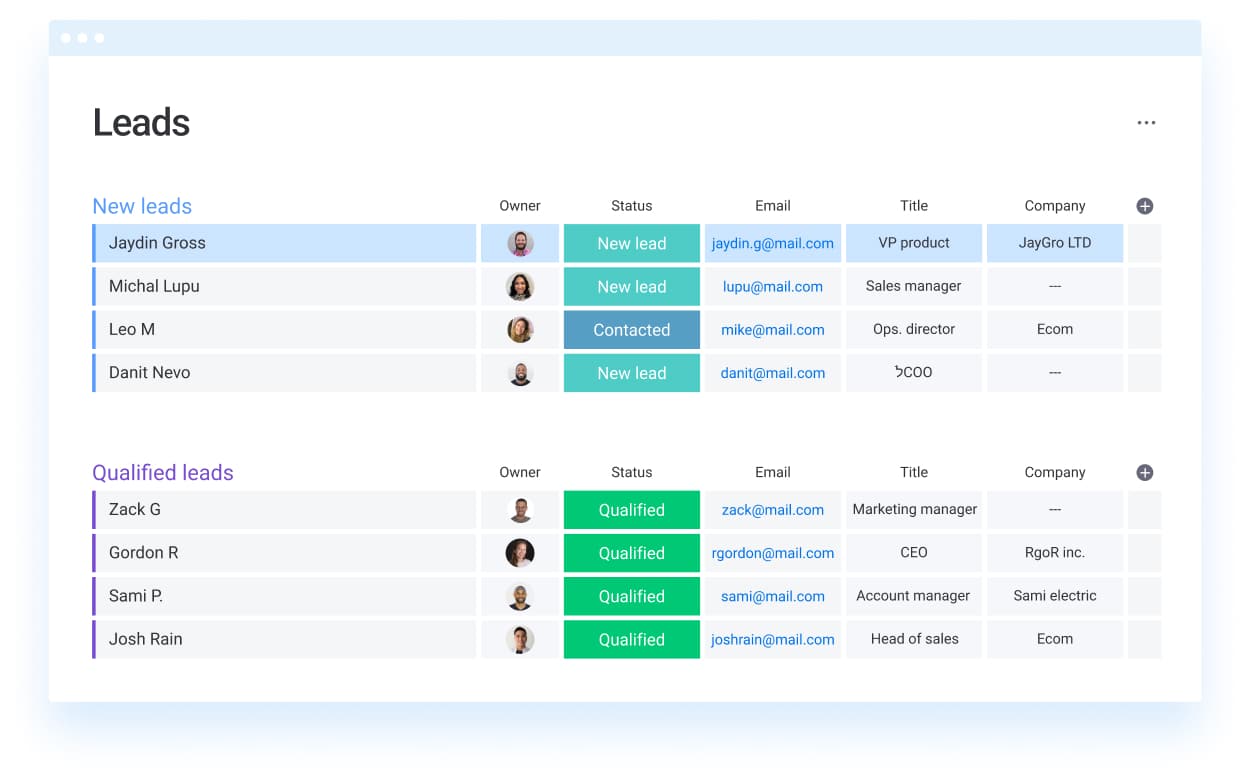
Lead generation software helps companies create and engage prospects to maximize sales opportunities and inform marketing campaigns.
These types of tools often focus on either inbound lead generation, which involves attracting prospects through content marketing, SEO, and social media; outbound lead generation, such as cold email campaigns, direct outreach, and advertising; or a combination of both.
Here are a few different types of lead generation platforms:
- Automation platforms: Streamline repetitive tasks like follow-ups and lead nurturing sequences.
- Data enrichment tools: Fill in missing contact and company data and insights to lead profiles.
- Lead scoring software: Assign values to leads based on behavior to help prioritize outreach.
- CRM platforms: Centralize lead data and track interactions throughout your sales pipeline.
- Live chat tools: Engage website visitors in real-time to capture and qualify leads instantly.
- Email marketing software: Send targeted campaigns to nurture prospects and drive conversions.
Some tools focus on a different aspect of creating new opportunities, such as engaging leads through email campaigns or capturing data from live chats. However, some lead management software like CRMs combine aspects of all types of lead management tools to keep workflows, data, and processes centralized.
Understanding the role of CRM in lead generation
Customer relationship management (CRM) tools have become integral for successful lead generation for businesses of any size. Anyone from small businesses to large enterprises can use CRMs to improve lead generation practices.
Lead generation software helps sales and marketing teams identify hot leads and create personalized content to close more deals and consistently engage.
CRM systems give teams a unified platform to do everything from capturing leads to managing prospect data and using insights to inform future campaigns. Teams can use a CRM as a centralized repository to funnel leads and prospect data from multiple channels, such as social media platforms, web forms, or ad campaigns.
CRM solutions that power lead generation
The right CRM becomes the engine that drives new business. Modern platforms combine automation, AI, and analytics to capture, qualify, and convert leads more efficiently than ever. Here are 5 standout CRMs to consider that exemplify how technology is transforming lead generation across industries and business sizes.
| Platform | Use case | Starting price | Free trial? | G2 rating |
|---|---|---|---|---|
| monday CRM | AI-automated lead generation | $12/seat/month | 14 days | 4.6/5 |
| HubSpot Smart CRM | Inbound marketing for lead generation | $45/seat/month | 14 days | N/A (no product listing for HubSpot Smart CRM yet) |
| Salesforce Sales Cloud | Enterprise lead management | $25/user/month | 30 days | 4.4/5 |
| Zoho CRM | Lead management for small businesses | $14/user/month | 15 days | 4.1/5 |
| Freshsales by Freshworks | B2B lead scoring and engagement | $9/user/month | 21 days | 4.5/5 |
Although each of these CRMs approaches lead generation differently, they all share one goal: helping teams work smarter, automate more, and turn promising prospects into long-term customers.
Note: Following HubSpot’s INBOUND 2025 announcements, HubSpot Smart CRM is now offered as a standalone product, no longer bundled exclusively with the platform’s Marketing, Sales, or Service Hubs. The standard CRM is still available as part of HubSpot’s free marketing tools.
AI and automation: The future of CRM for lead generation
Many modern CRMs, including some of the platforms on our list above, use AI and automation to help companies improve lead generation procedures. Whether by tackling manual tasks like follow-ups or speeding up processes such as personalized messaging, AI and automation are on track to significantly impact what the future of lead generation CRM software looks like.
For B2B lead generation, AI-powered CRM systems can analyze long-sales-cycle behaviors, prioritize high-value accounts, and trigger personalized outreach at the right time. In real estate lead generation, these systems can monitor property-listing engagement, score potential buyers or renters, and automatically assign follow-ups — helping agents stay ahead of opportunities.
Let’s take a closer look at the areas where AI and automation stand to have the biggest influence:
- Lead scoring: Analyze how leads interact with your content and automatically assign scores based on engagement levels.
- Prospect prioritization: Use AI to rank leads by their likelihood to convert so your team knows which prospects to focus on first.
- Lead nurturing: Send the right content at the right time based on data such as prospect preferences, past engagement, or sentiment analysis.
- Follow-up sequences: Trigger timely messages when prospects take specific actions like opening an email or visiting your website.
- Personalized messaging: Leverage AI to create custom email copy and recommendations based on past interactions or purchase history.
- Real-time engagement: Power chatbots that respond to questions instantly and qualify leads even when your team is offline.
Key strategies for effective CRM-driven lead generation
CRMs are software powerhouses when it comes to implementing key strategies that drive lead generation. While some people may think a CRM’s core purpose is to improve existing client relationships, the data, automations, workflows, and content you can generate from these systems can drastically improve lead generation processes.
Here are a few key strategies to adopt for CRM-powered lead generation:
Keep your CRM data clean
Everything starts with your data. Whether you’re looking at what converted a lead into a paying customer in the past or you want to understand new prospects’ preferences, you need to have clean, reliable data to lean on.
With a system like monday CRM, teams can automate activities like merging duplicate data or enriching client records to ensure CRM data is always relevant.
Segment incoming leads for easy sorting
When new leads come in, it’s important to treat them as soon as possible. One of the best ways to do this is to segment them into different categories. This might be based on demographics, how engaged they are, geographic location, behavioral patterns, or anything else that differentiates potential clients.
By segmenting leads, sales agents can then focus on the highest-priority contacts or those that are most likely to convert based on historical trends.
Leverage CRM content for lead generation
Content marketing is essential to generate more leads, with 74% of companies agreeing it’s one of the most effective ways to generate leads. CRMs with built-in AI and content generation tools can be a great help in creating relevant content for every stage of the customer journey, including lead generation.
Use your CRM data to build content for lead magnets, such as ebooks, engaging forms, or downloadable content, using information on how past leads converted. Thanks to AI tools, CRMs can help teams quickly create content that’s relevant to every segment.
Implement actionable plans based on CRM insights
CRMs are packed with valuable insights and data analytics. Whether through reports or sales dashboards, always keep an eye on your CRM data to gain insights into customer behavior and preferences that you may have overlooked.
For example, sales forecasts can show which lead sources are generating the most conversions, helping you allocate resources to the channels that drive the best results.
Automate lead nurturing to boost engagement
Automations are a core feature of most CRMs, and they’re not only good for helping sales teams work faster, but they can also take care of lead nurturing around the clock.
Use your CRM to build custom automations to engage clients with the right content at the right time, such as automating a drip campaign or suggesting products based on a lead’s shopping patterns.
Use CRM data to personalize interactions
According to surveys, over 75% of business leaders believe personalization is key to business success and that AI holds potential to impact personalization strategies. When it comes to getting and converting more leads, personalization is key. CRM data holds a wealth of information that can be used to inform marketing strategies and specific content to create sales funnels that are personalized to lead preferences and behaviors.
Automate lead generation with monday CRM’s advanced AI
Lead generation is just the beginning. The real value of a powerful CRM lies in how it helps teams manage, nurture, and convert those leads into loyal customers.
With monday CRM, you get an AI-powered platform that not only captures new prospects but automates follow-ups, prioritizes high-intent leads, and streamlines the entire sales funnel. Its intuitive drag-and-drop interface makes it easy for any team to get started, while smart automations and customizable workflows scale effortlessly as your business grows.
Let’s take a closer look at how monday CRM’s AI features elevate lead generation and management from first contact to close.
AI workflows and automations
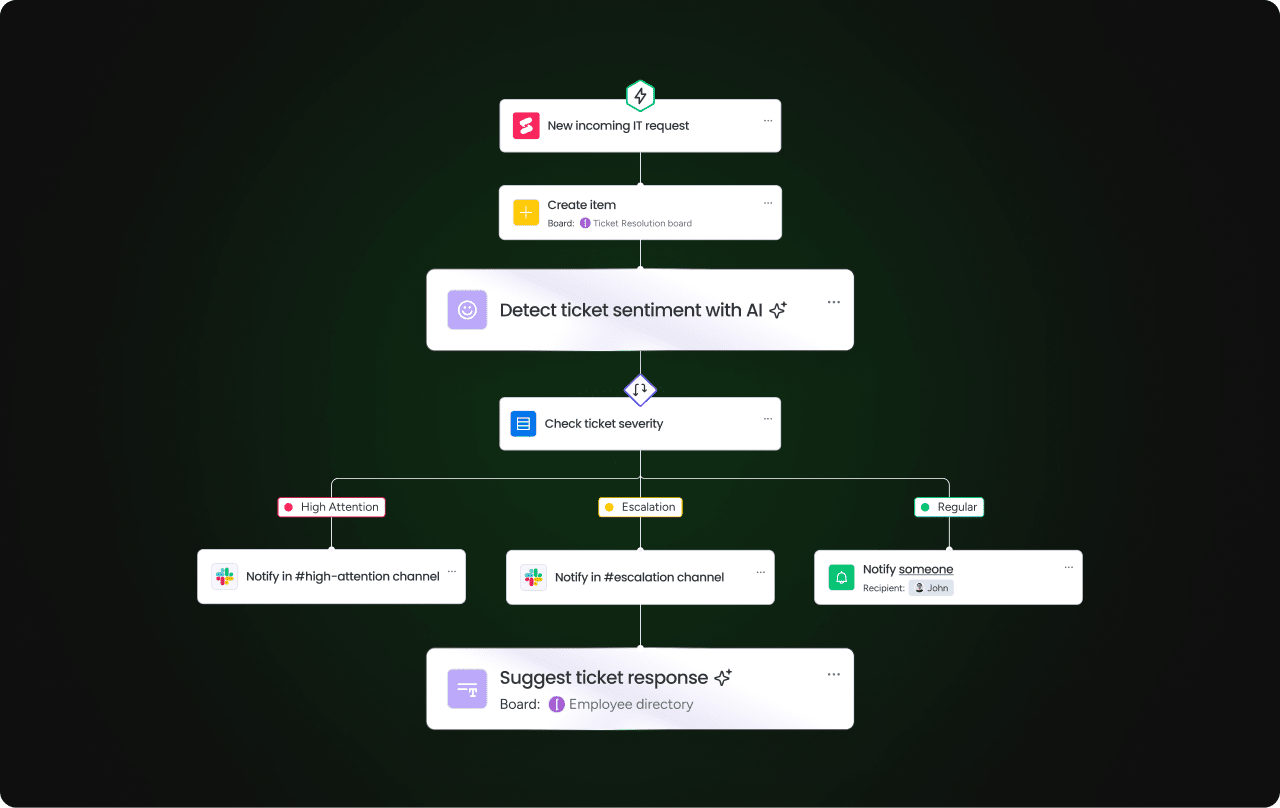
Users can build their own custom automations in minutes and rely on AI to trigger workflows based on lead behaviors, deadlines, or specific actions. For example, you can automatically assign high-priority leads to specific team members, send personalized follow-up emails when a prospect opens a proposal, or trigger an alert when a lead visits your pricing page.
AI-powered lead management
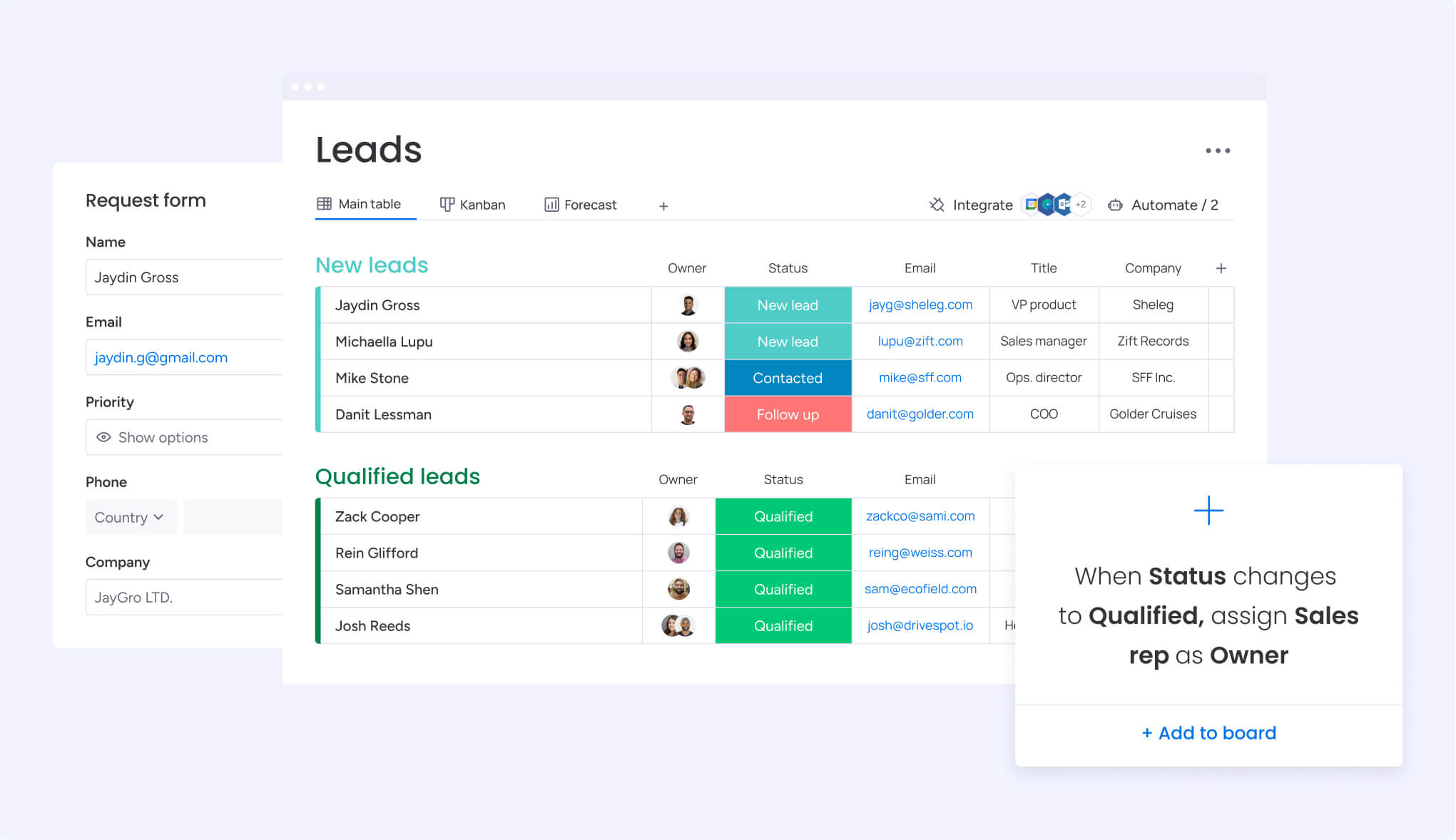
Manage incoming leads in the blink of an eye with monday CRM’s AI-powered system that sorts new leads into segments. Instantly prioritize potential customers, assign scores, and route them to the right sales agents, clearing up more time for your sales teams to find new leads and nurture existing relationships.
Sales and marketing collaboration
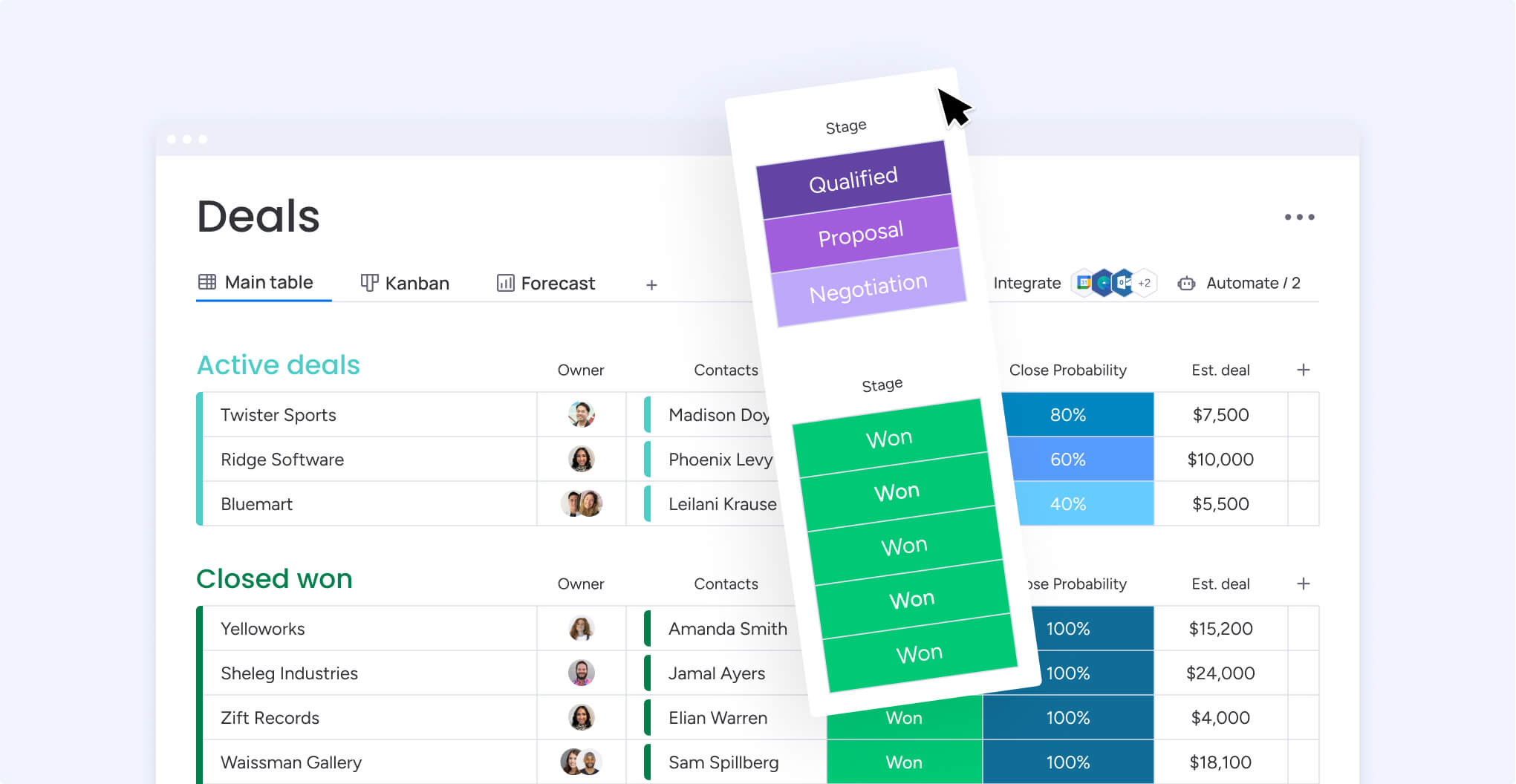
Sales and marketing teams can work together on the same platform to exchange data and facilitate easy handover. While sales teams close deals and build lasting customer relationships, marketing professionals can use insights from your CRM to create more targeted ad campaigns that generate better leads.
In-depth data insights and analytics
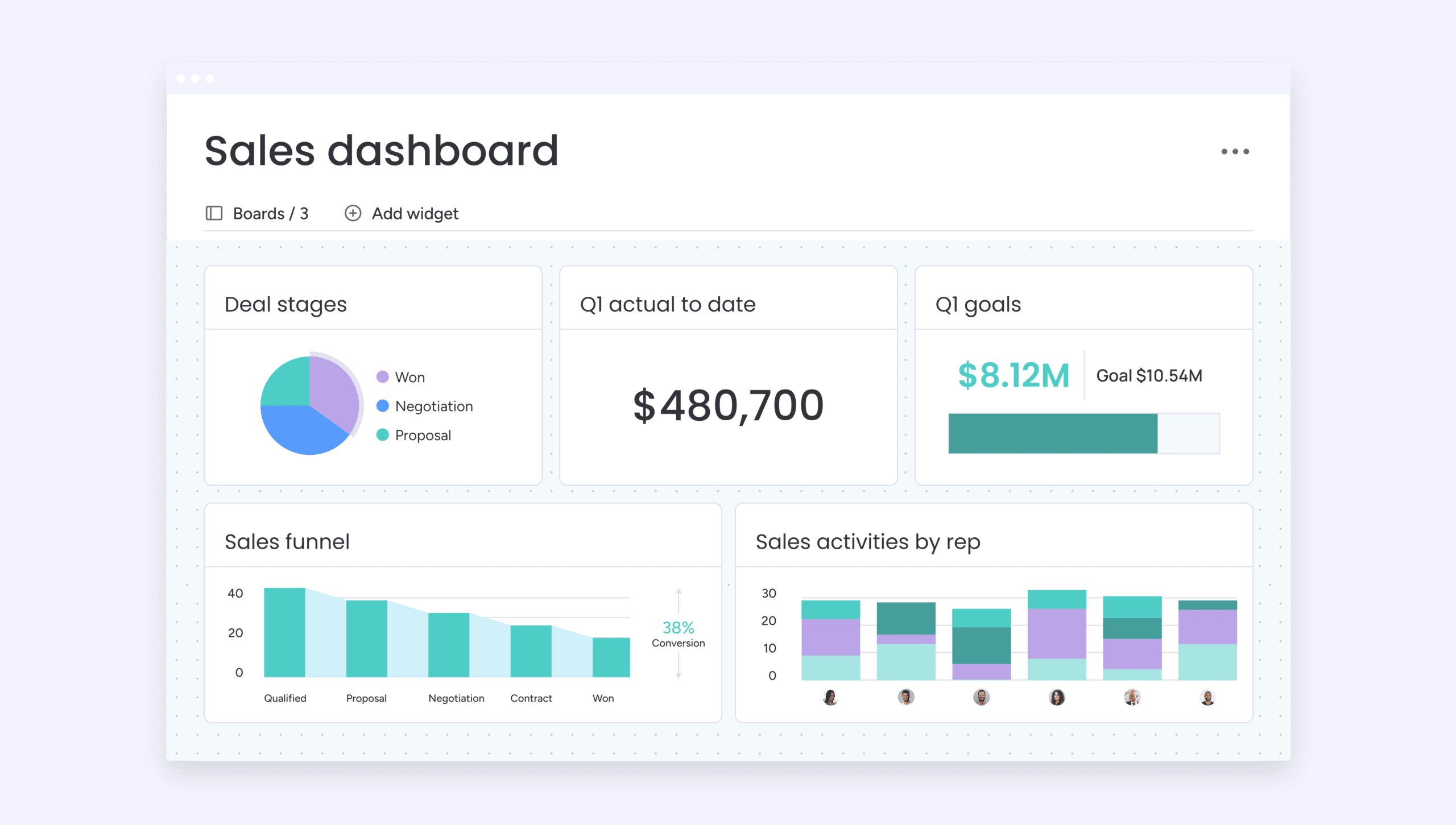
Teams can unlock advanced sales dashboards, AI-generated reports, and high-level insights with monday CRM. Additionally, with built-in predictive analytics and sales forecasting features, teams can make smarter decisions, such as determining which channels produce the best leads, so resources, time, and budgets can be allocated more efficiently.
Try monday CRMCRM integrations: Expanding your lead generation ecosystem
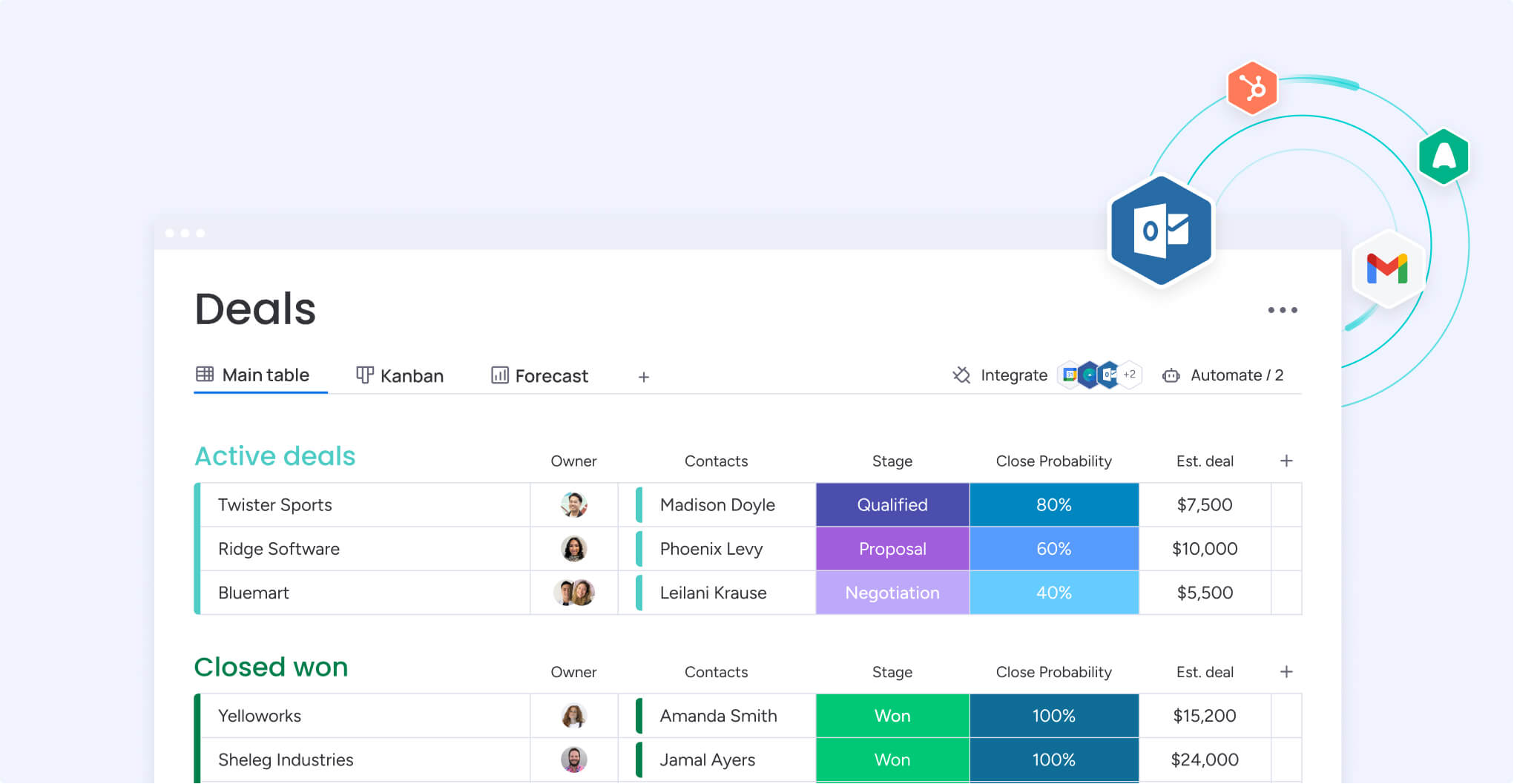
CRMs can do a lot of heavy lifting to reach new leads, but the real magic happens when you integrate your most valuable work tools. Integrating platforms like social media channels and messaging apps can go a long way in boosting how and where you generate new leads. Let’s take a look at the different types of apps and work tools you should integrate into your CRM to expand your lead generation strategies.
- Communication tools: Integrate communications platforms like WhatsApp to capture leads and data directly from direct messages and conversations.
- Marketing software: Connect email marketing systems like Mailchimp or landing page builders to instantly sync new leads into your CRM.
- Social media apps: Link social apps like Facebook, Instagram, or LinkedIn to track social interactions, monitor social mentions and reputation, and engage with followers.
- Automation platforms: Use tools like Zapier to build custom integrated workflows that move leads between various systems and your CRM without manual entry.
- Sales software: Connect sales call tools like Zoom to log meetings, transcribe conversations, and identify high-intent prospects.
- Lead capture forms: Integrate form builders like Typeform to instantly add new submissions and sort relevant data in your CRM pipeline.
- Analytics tools: Add integrations to platforms like Google Analytics to track which webpages and campaigns are generating the most qualified leads.
Sales and marketing professionals who use monday CRM can easily integrate with over 200 different apps, making it quick and painless to sync data and workflows. This way, your team is notified in your CRM even when a lead interacts with content on another platform so that you can avoid missing high-value opportunities.
Bring your lead generation to the next level with the right CRM
Selecting the right CRM for lead generation can have a huge impact on how your business attracts and converts prospects. Whether you’re a small business looking for budget-friendly options or an enterprise team that needs advanced automation and reporting, flexible and scalable solutions like monday CRM are built to fit a range of needs.
With integrated AI and automation features, investing in a monday CRM for lead generation will allow your team to work smarter to fill your pipeline with quality leads.
FAQs
What is the difference between lead generation software and a CRM?
Lead generation software focuses specifically on finding and capturing new prospects through tactics like web forms, landing pages, and outreach campaigns. CRMs manage the entire customer relationship lifecycle, including lead tracking, nurturing, sales pipeline management, and customer retention. Many modern CRMs include built-in lead generation features, blending both capabilities into one platform.
How can I use a CRM to generate leads for my business?
You can use your CRM to capture leads through web forms and landing pages, score prospects based on engagement, automate follow-up sequences, and segment contacts for targeted campaigns. Track which sources generate quality leads, nurture prospects with personalized content, and analyze data to refine your approach. Additionally, integrating your CRM with marketing tools and social media can significantly expand your reach.
What features should I look for in an AI-powered CRM for lead generation?
An AI-powered CRM should include features for smart lead scoring to predict conversion likelihood, automated personalization for emails and content, predictive analytics for prospect prioritization, and AI chatbots for real-time engagement. Some other valuable features include automated data enrichment, sales recommendations, sentiment analysis, and advanced reporting that identifies patterns in your most successful leads.
Can a CRM help with lead generation for real estate?
Yes, a CRM can definitely help real estate agents and brokers with lead generation by capturing leads from property listings, open houses, and websites, then nurturing them through automated drip campaigns. Features like property matching, market updates, and transaction tracking keep prospects engaged and many CRMs can also be used on mobile devices for real estate agents who are constantly on the move.
Is there a free CRM that is effective for lead generation?
Yes. Offering a free plan, monday CRM includes essential lead generation tools like contact management, email tracking, and basic automations. You can explore more free options in our guide to the best free CRMs. Free plans are great for getting started, but upgrading unlocks advanced automations, analytics, and AI features that help teams scale lead generation efficiently.
